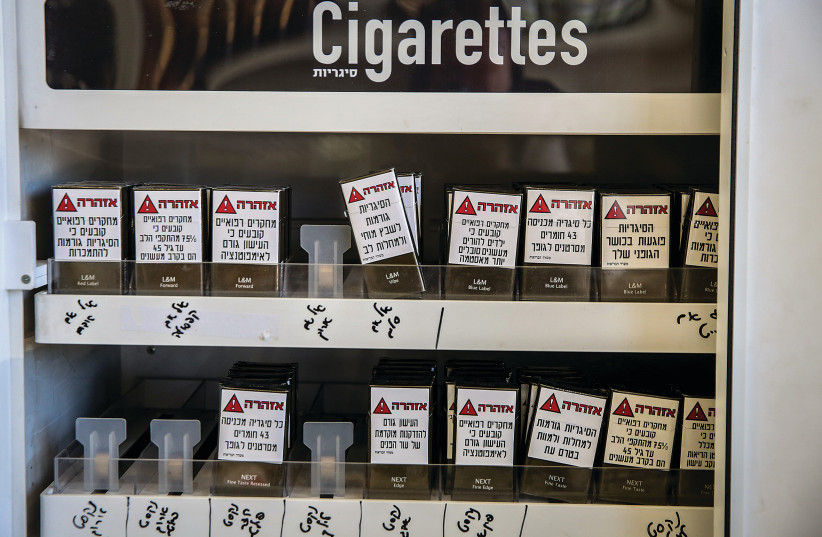The Health Ministry, which over the years has been very lax in fighting conventional tobacco and electronic cigarettes, issued on Monday a request for public comments on an “action plan for all tobacco and smoking products.” It included plans to eventually prohibit smoking under the age of 21 and not just under 18 as it is today.
The document was signed by Dr. Sharon Elroy-Preis, head of the ministry’s public health division, and Dr. Ephrat Aflalo, head of its health promotion department.
Health Minister Moshe Arbel said that “The phenomenon of smoking is very worrying and under my leadership, we are determined to promote measures to reduce it and increase awareness of the harm smoking causes. This demands a complex and joint effort, and we are committed to implementing the policy in a variety of areas of prevention and encouraging quitting to promote public health and protect youngsters and adults alike from this serious damage to health.”
Ministry director-general Moshe Bar Siman Tov added that “given the dimensions of the spread of smoking, we have examined all possible measures and continue to act in many ways in order to raise awareness of the dangers of using these products. We recommend adopting a strict policy and dramatic measures required by the necessity of reality, but it’s clear to all of us that the best way to stop smoking is not to start smoking.
Abnormally high smoking rate in Israel
The current Israeli smoking rate for ages 20 and above is 20% -- far higher than the average in most Western countries, and it has not changed since 2007.

When Ya’acov Litzman of Agudat Yisrael was the health minister, he refused to allow graphic images of organs damaged by tobacco to be placed on cigarette packets because it would “disturb innocent children.” He suggested placing pictures of Jerusalem on them instead. Even today, ultra-Orthodox (haredi) newspapers write articles with the same position.
In 2017, Litzman was attacked in a Knesset committee for his “intervention on behalf of the tobacco industry” when he allowed iQOS “warmed tobacco” cigarettes to be sold without any restriction. Litzman also stopped the annual meeting with reporters on No Smoking Day who received a printed report – required by law to be presented to the Knesset – on what the ministry had done (or not done) in the previous year.
Prof. Hagai Levine, chairman of the Association of Public Health Physicians, said on Monday that he “welcomed the publication of an action plan to deal with the harms of tobacco products and smoking for public comments. If the recommendations like graphic warnings are implemented as soon as possible, many Israeli lives will be saved.”
However, Levine added that the plan “lacks timetables and a decision on a budgeted and staffed multi-system national plan, in accordance with a government decision that has not been implemented since 2011. The ministry expert in charge of fighting smoking left long ago and has not been replaced.”
Amos Hausner, head of the Israel Council for the Prevention of Smoking, commented that the new proposal “completely ignores the need to protect people from enforced smoking. This includes the protection from incursion of smoke into other homes.”
Hausner referred to a recent article published in the Israel Journal of Public Health Policy according to which just one person who smokes can harm people in 10 neighboring homes (at least 20 people), Further, the proposal completely ignores the need to remove all smoking rooms. The announcement was “too little and too late.”
He added that “tobacco products are still allowed for sale at duty-free shops; as to the ban on flavors in e-cigs, respiratory and heart disease from cigarettes with flavors are not much different from diseases caused by those without flavors; the same is with damage to the cell’s DNA. It’s illegal to smoke under covered bus stations, but there are no signs and no enforcement. In addition, all smoking rooms must be barred because the smoke travels easily from one room to another, as proven in many studies."
Hausner said he was disappointed that the ministry does not require that in places where public smoking is banned, there are no symbols and wording that specifically announce the ban on e-cig smoking in public places.
Israel Cancer Association (ICA) director Moshe Bar-Haim said it was “an important and vital step at a time when youngsters are able to buy addictive and deadly smoking products illegally in kiosks.”
The ICA’s health-promotion official Dana Frost added that “the time has come for a real and dramatic change in the investment of manpower and budgets for the fight against smoking.”

According to the ministry’s announcement, the team worked in four sub-teams – policy, enforcement, advocacy, training, and influence, and included partners from government ministries, civil society, youth representation, parents, local government, various doctors including pediatricians and psychiatrists, academia and other professionals.
“We also call on parents to be aware of the threat and talk to their children about the issue. The Ministry of Health will continue extensive actions to raise awareness of the growing and widespread phenomenon of smoking and the harms of smoking products, in particular electronic cigarettes, which have become frequently used among teenagers and young adults.”
Among the topics dealt with in the “action plan” were deciding on the prohibition of flavors; giving powers to enforce the nicotine concentration limit that exists today in the legislation (in relation to electronic cigarettes) to the ministry; limiting the volume of the filling liquid allowed for import, marketing; and sale; requiring graphic warnings on all tobacco and smoking products and visual uniformity to the smoking and vaping products; a ban on the sale of disposable electronic cigarettes; selling tobacco and smoking products in designated stores only and reducing the number of points of sales; raising the selling age to 21; giving authority to the ministry to enforce a ban on advertising on the Internet; equalizing taxation on e-cigs and other tobacco products; and applying taxation to nicotine intended for non-medical use.
The ministry statement declared that “e-cigs are the gateway to smoking for young people who start experimenting with them at a young age; there is no strong evidence that e-cig use helps smokers kick the habit compared to the proven safety of other means of withdrawal such as smoking-cessation workshops, nicotine gums and patches and medical treatment; the scientific evidence on the health damage of e-cigs in the short and medium term is known and described in the literature as affecting the respiratory system, cardiovascular system, trauma and burns, the developing brain in children and the creation of addiction.
